Wolfram Function Repository
Instant-use add-on functions for the Wolfram Language
Function Repository Resource:
Simulate the evolution of a Wolfram model system as a "glocal" (hybrid of global and local) multiway system
ResourceFunction["WolframModelGlocalMultiwaySystem"][rules,init,n] generates the results of n steps in the glocal multiway evolution of a Wolfram model system with the specified rules, starting from initial conditions init. | |
ResourceFunction["WolframModelGlocalMultiwaySystem"][rules→sel,init,n] uses the function sel to select which of the events obtained at each step to include in the evolution. |
| "Sequential" | applies the first possible replacement (sequential substitution system) |
| "Random" | applies a random replacement |
| {"Random",n} | applies n randomly chosen replacements |
| "DeduplicateTokens" | False | whether to merge all instances of equivalent tokens that appear at each time step |
| "VertexRendering" | True | whether to use special rendering for state/token and event vertices |
| "IncludeInitializationEvents" | False | whether to include pseudoevents that set up initial conditions |
| "StateRenderingFunction" | Automatic | how to label states/tokens that appear in the evolution causal graph/token event graph |
| "EventRenderingFunction" | Automatic | how to labels events that appear in the evolution causal graph/token event graph |
| Automatic | make a label from the name of the vertex |
| Inherited | use the explicit vertex name as the label |
| None | use no label for the vertex |
| "string" | use a shape from the VertexShapeFunction collection |
| func | apply the function func to the name of the vertex |
Generate evolution causal graphs (token event graphs) for two simple Wolfram model glocal multiway systems:
| In[1]:= |
|
| Out[1]= |
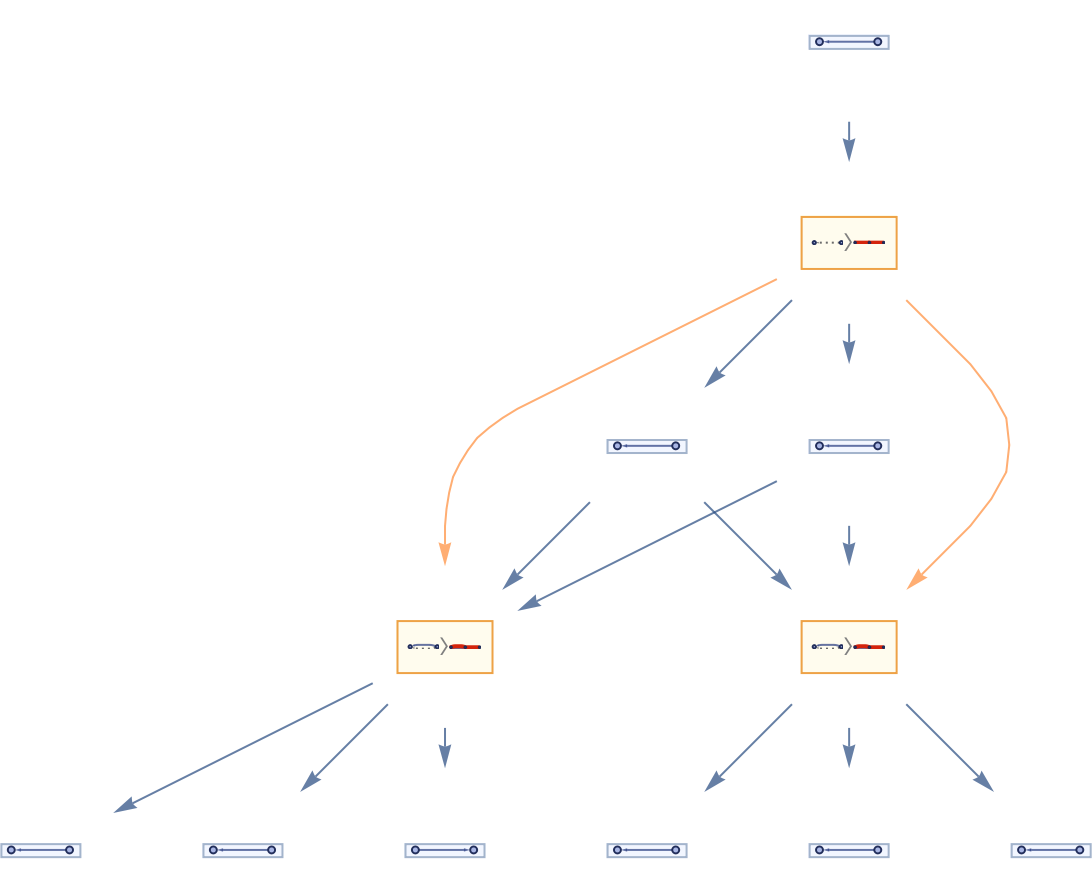
|
| In[2]:= |
![ResourceFunction[
"WolframModelGlocalMultiwaySystem"][{{{1, 1, 2}} -> {{2, 2, 1}, {2, 3, 2}, {1, 2, 3}}, {{1, 2, 1}, {3, 4, 2}} -> {{4, 3, 2}}}, {{{1, 1, 1}}}, 2, VertexSize -> 0.8]](https://www.wolframcloud.com/obj/resourcesystem/images/0a0/0a0cdd51-fb02-4bb6-99f2-41a751d342ce/0553c979d07645c2.png)
|
| Out[2]= |
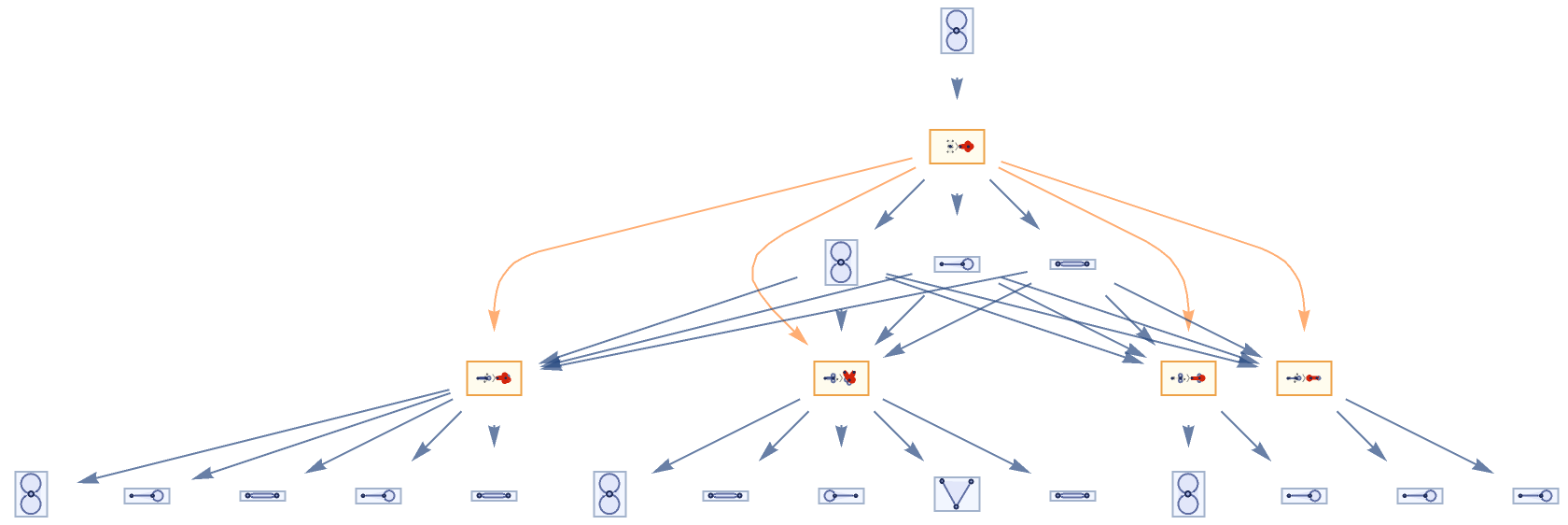
|
Show just the structure of the graphs, without labels:
| In[3]:= |
|
| Out[3]= |
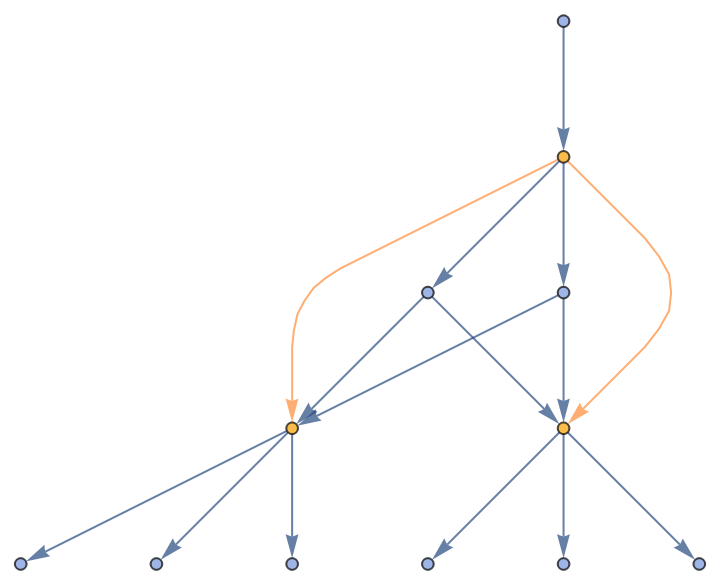
|
| In[4]:= |
![ResourceFunction[
"WolframModelGlocalMultiwaySystem"][{{{1, 1, 2}} -> {{2, 2, 1}, {2, 3, 2}, {1, 2, 3}}, {{1, 2, 1}, {3, 4, 2}} -> {{4, 3, 2}}}, {{{1, 1, 1}}}, 2, "VertexRendering" -> False]](https://www.wolframcloud.com/obj/resourcesystem/images/0a0/0a0cdd51-fb02-4bb6-99f2-41a751d342ce/16e85094d9a850e4.png)
|
| Out[4]= |
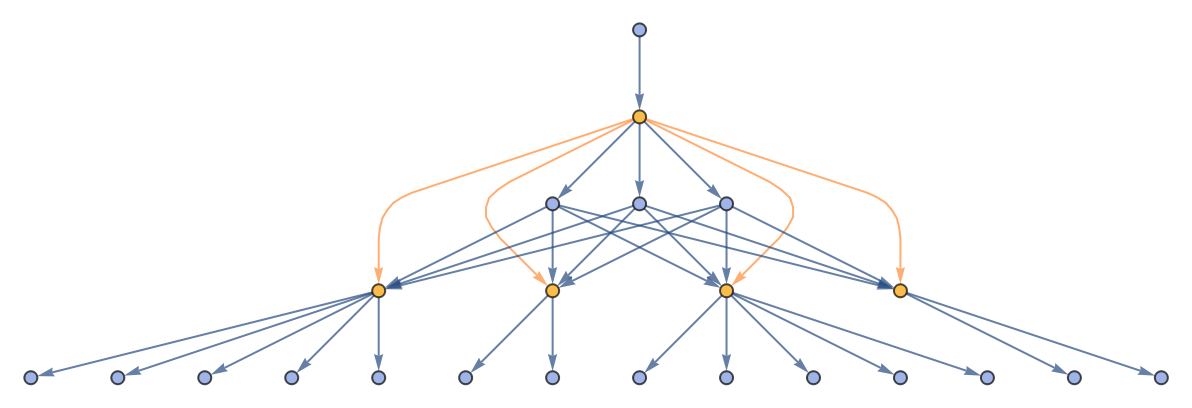
|
Generate an evolution causal graph (token event graph) for a more complicated Wolfram model glocal multiway evolution:
| In[5]:= |
|
| Out[5]= |
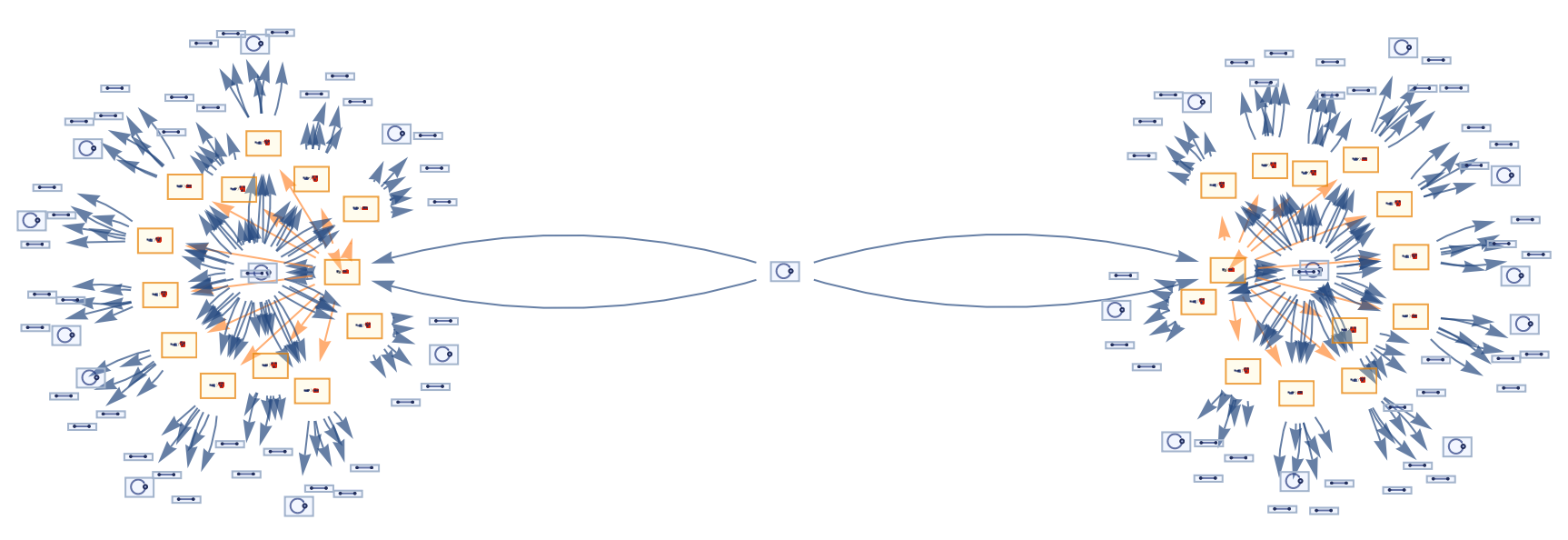
|
Show just the structure of the graph, without labels:
| In[6]:= |
|
| Out[6]= |
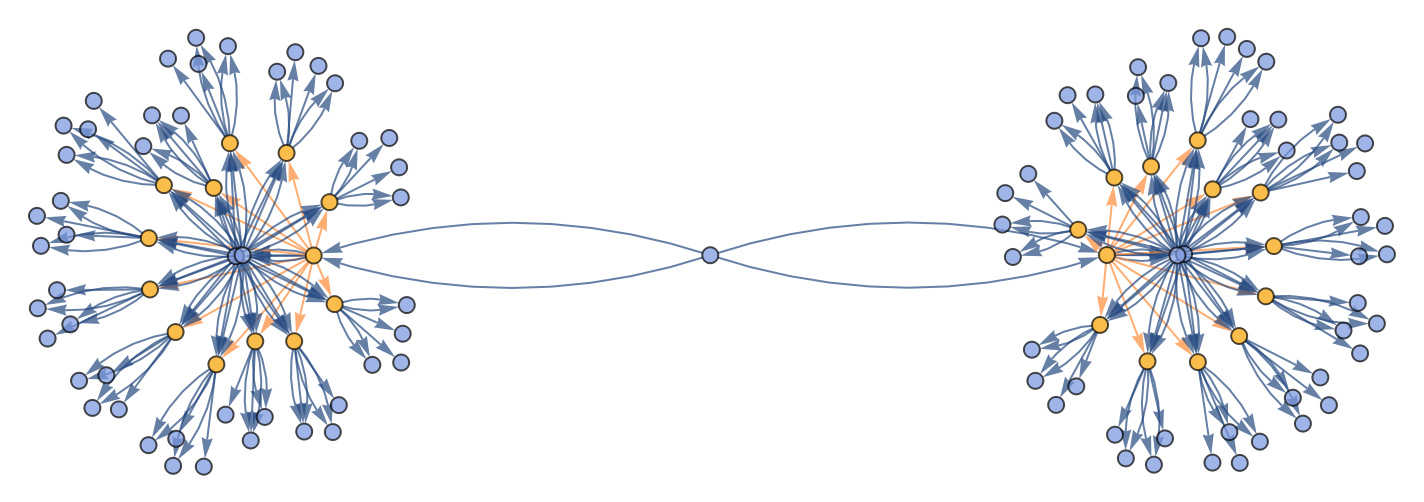
|
Merge all instances of equivalent tokens that appear at each time step:
| In[7]:= |
|
| Out[7]= |
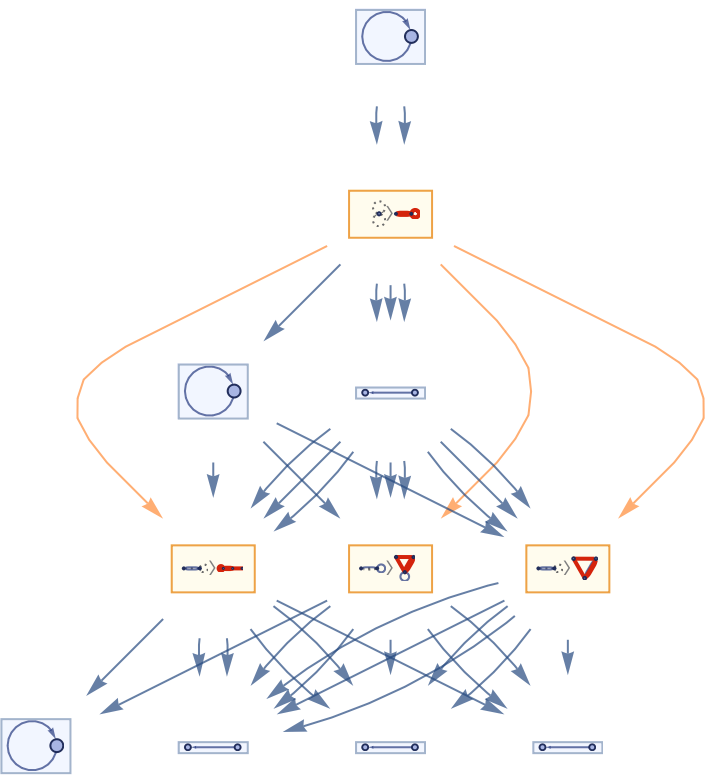
|
Run the system for more steps:
| In[8]:= |
|
| Out[8]= |

|
Show just the structure of the graphs, without labels:
| In[9]:= |
|
| Out[9]= |
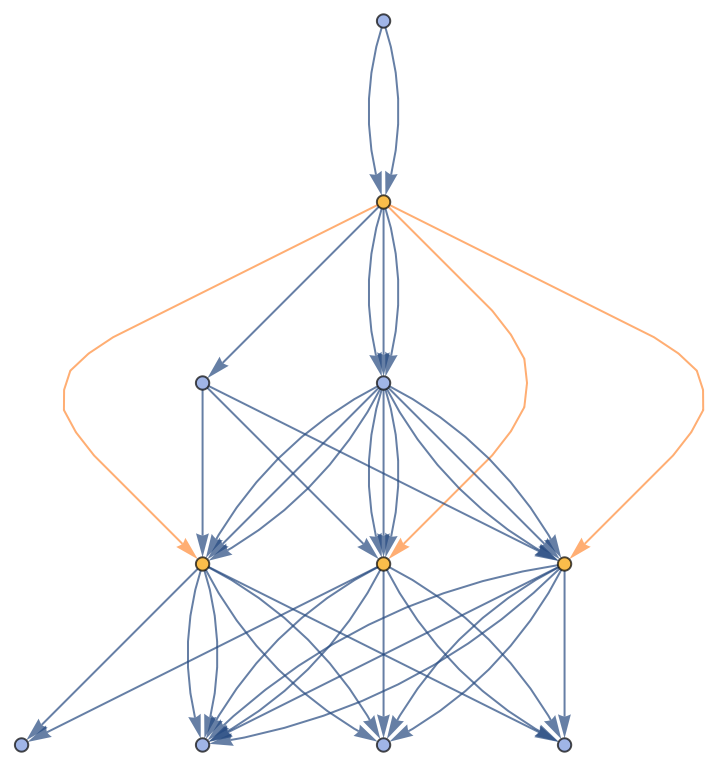
|
| In[10]:= |
|
| Out[10]= |

|
Specify an event selection function that picks only up to two events at each step:
| In[11]:= |
![ResourceFunction[
"WolframModelGlocalMultiwaySystem"][({{x, y}, {x, z}} -> {{x, z}, {x,
w}, {y, w}, {z, w}}) -> (Take[#, UpTo[2]] &), {{0, 0}, {0, 0}}, 3, VertexSize -> 1]](https://www.wolframcloud.com/obj/resourcesystem/images/0a0/0a0cdd51-fb02-4bb6-99f2-41a751d342ce/392b9145ff60583a.png)
|
| Out[11]= |
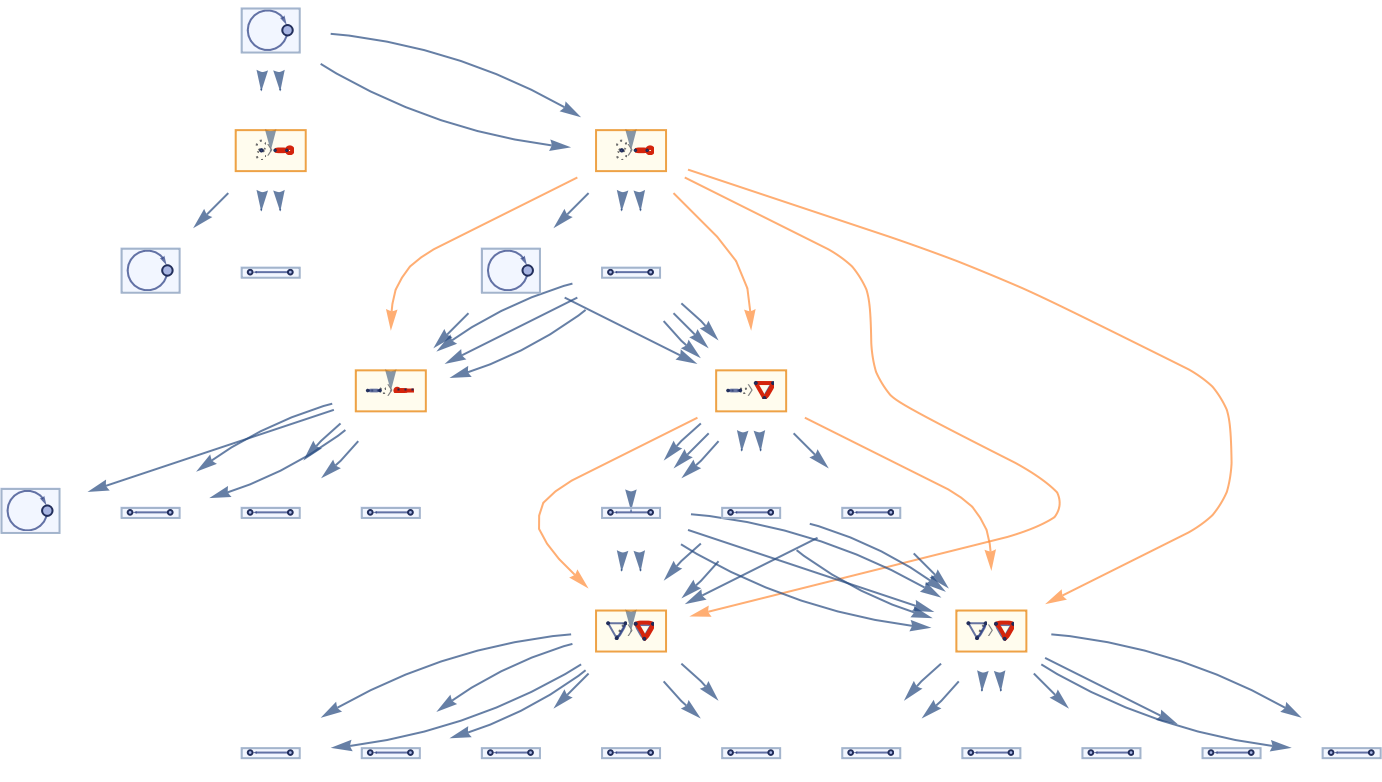
|
WolframModelGlocalMultiwaySystem accepts both individual rules and lists of rules:
| In[12]:= |
|
| Out[12]= |
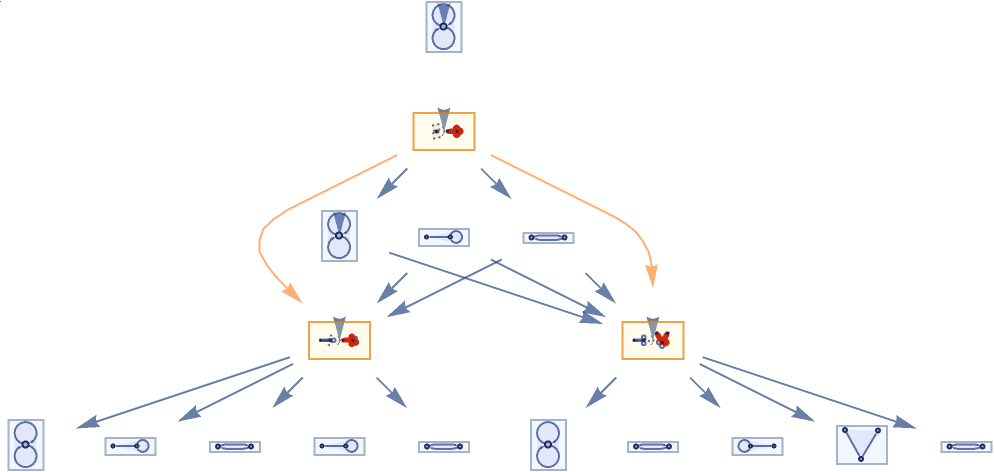
|
| In[13]:= |
![ResourceFunction[
"WolframModelGlocalMultiwaySystem"][{{{1, 1, 2}} -> {{2, 2, 1}, {2, 3, 2}, {1, 2, 3}}, {{1, 2, 1}, {3, 4, 2}} -> {{4, 3, 2}}}, {{1, 1, 1}}, 2, VertexSize -> 1]](https://www.wolframcloud.com/obj/resourcesystem/images/0a0/0a0cdd51-fb02-4bb6-99f2-41a751d342ce/63f776f2fcb043b1.png)
|
| Out[13]= |
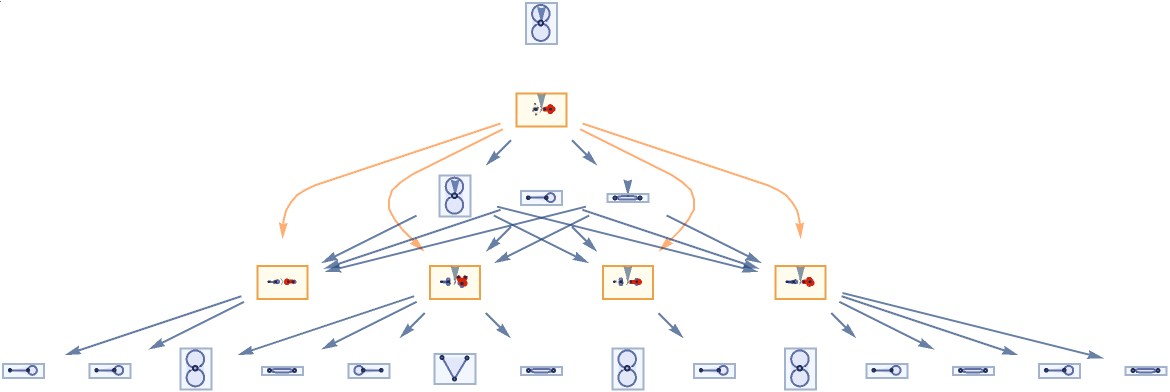
|
Likewise for initial conditions:
| In[14]:= |
![ResourceFunction[
"WolframModelGlocalMultiwaySystem"][{{{1, 1, 2}} -> {{2, 2, 1}, {2, 3, 2}, {1, 2, 3}}, {{1, 2, 1}, {3, 4, 2}} -> {{4, 3, 2}}}, {{{1, 1, 1}}, {{1, 1, 1}, {2, 2, 2}}}, 2, VertexSize -> 4]](https://www.wolframcloud.com/obj/resourcesystem/images/0a0/0a0cdd51-fb02-4bb6-99f2-41a751d342ce/3f4988475b9d9b78.png)
|
| Out[14]= |
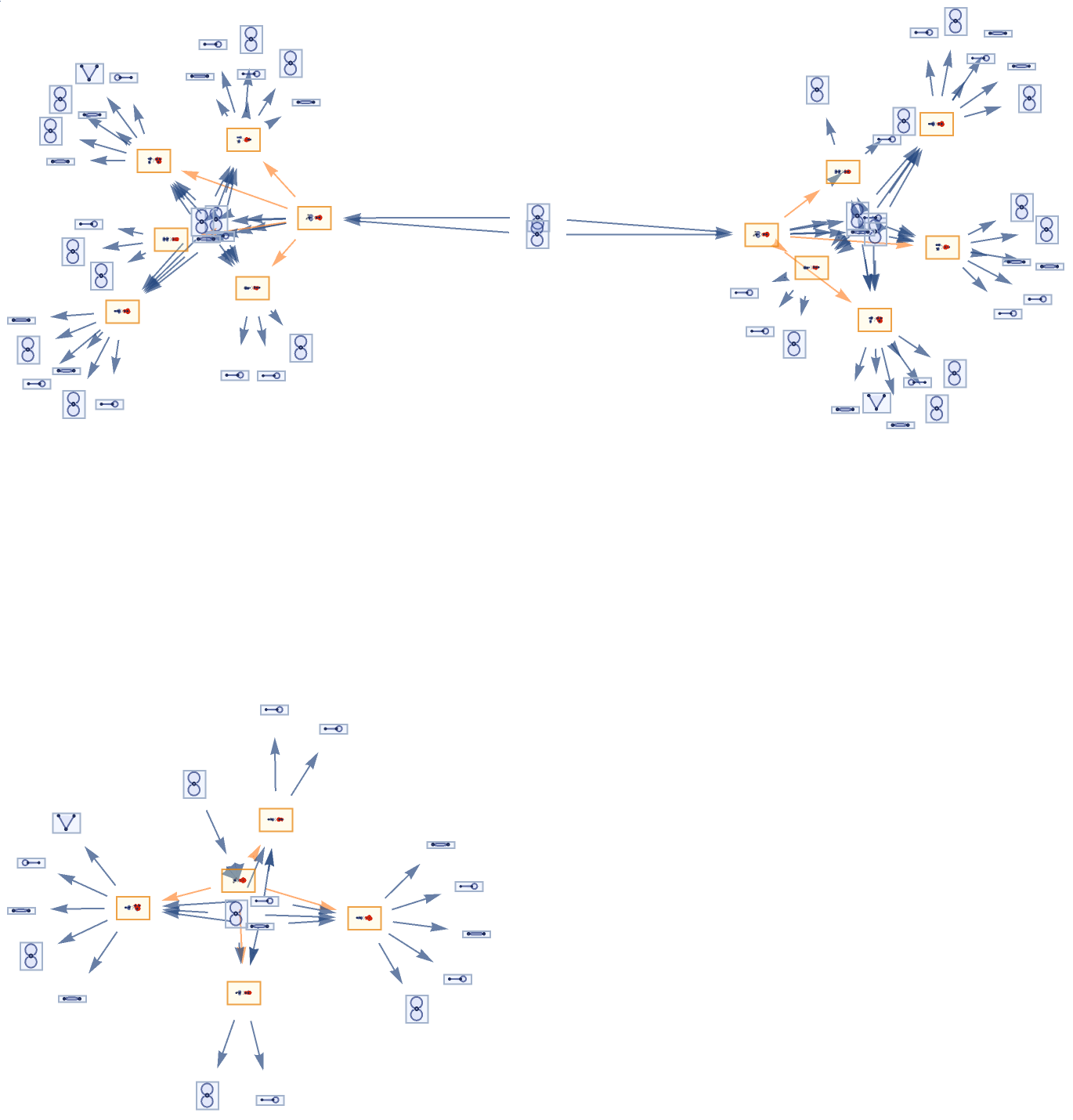
|
Apply only the first possible event at each step:
| In[15]:= |
|
| Out[15]= |
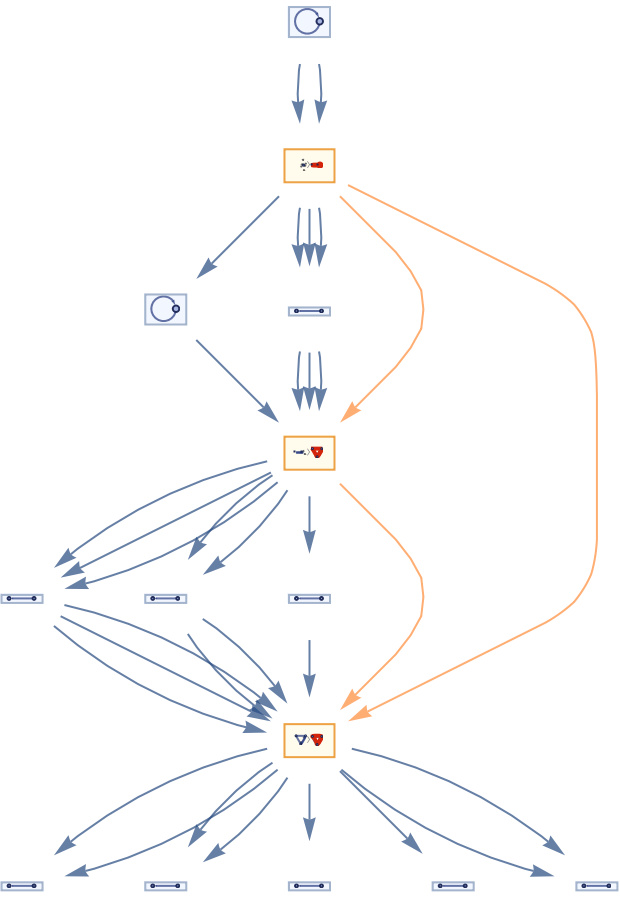
|
Apply the first and last possible events at each step:
| In[16]:= |
![ResourceFunction[
"WolframModelGlocalMultiwaySystem"][({{x, y}, {x, z}} -> {{x, z}, {x,
w}, {y, w}, {z, w}}) -> ({First[#], Last[#]} &), {{0, 0}, {0, 0}}, 3, VertexSize -> 0.8]](https://www.wolframcloud.com/obj/resourcesystem/images/0a0/0a0cdd51-fb02-4bb6-99f2-41a751d342ce/7bdd0d342bfceed2.png)
|
| Out[16]= |
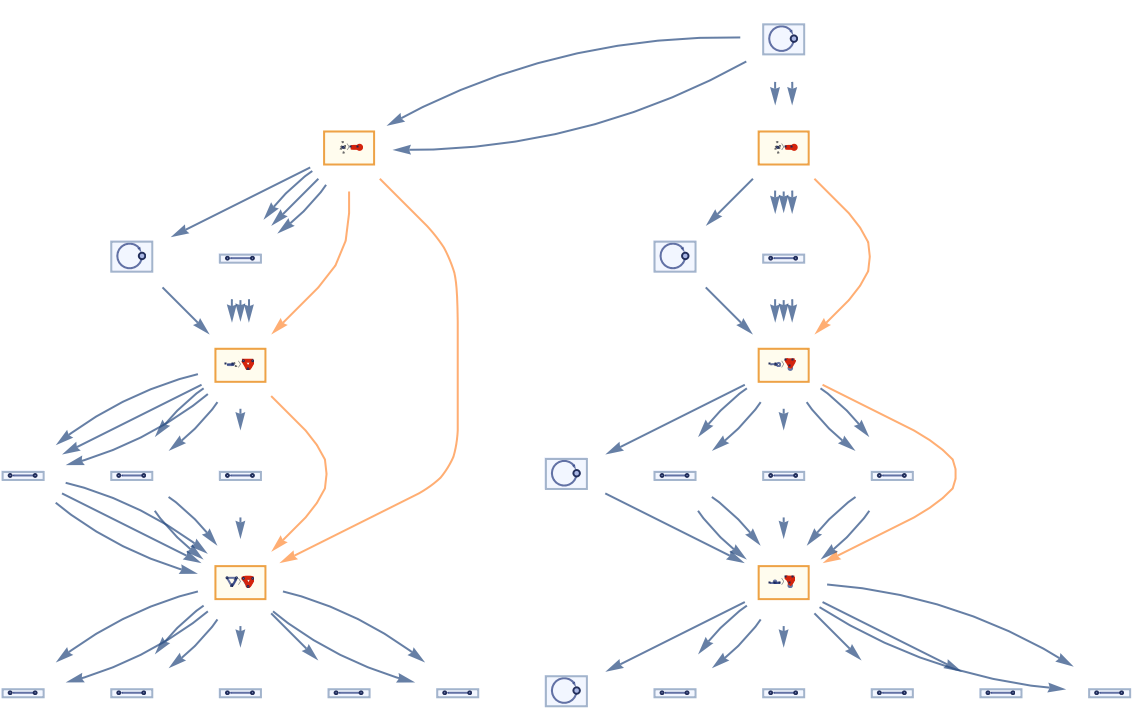
|
Compare this to the full evolution causal graph (token event graph):
| In[17]:= |
|
| Out[17]= |
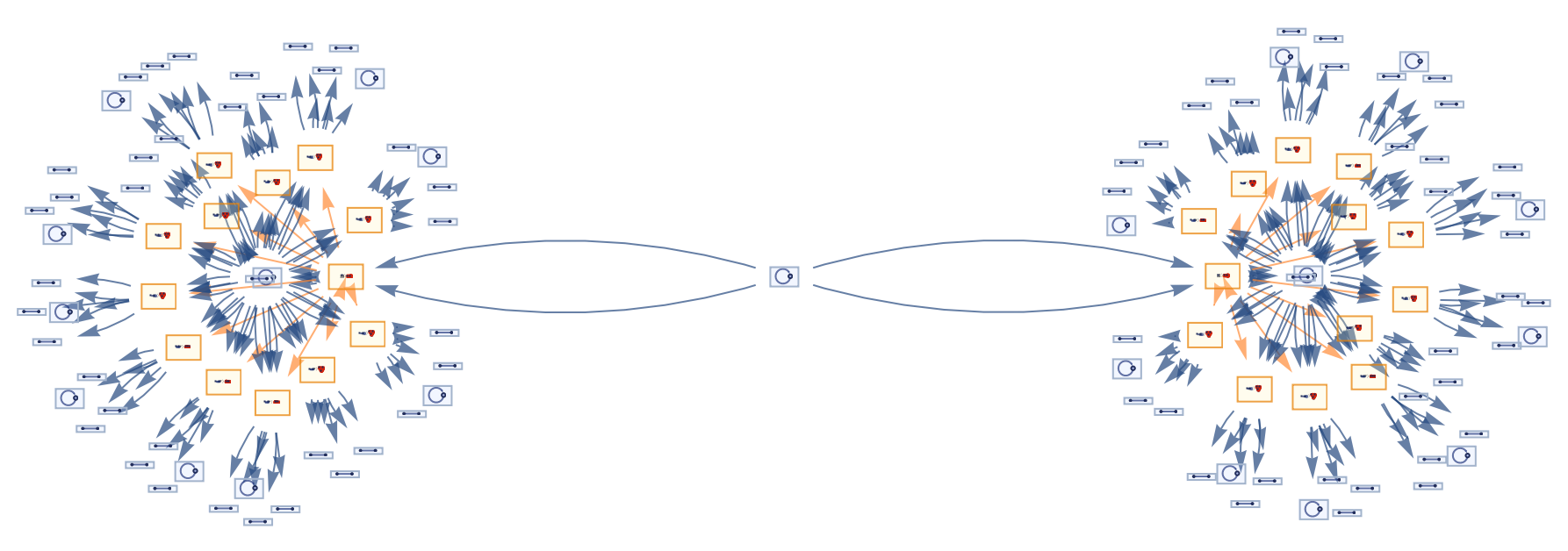
|
By default, equivalent tokens remain unmerged at each time step:
| In[18]:= |
|
| Out[18]= |
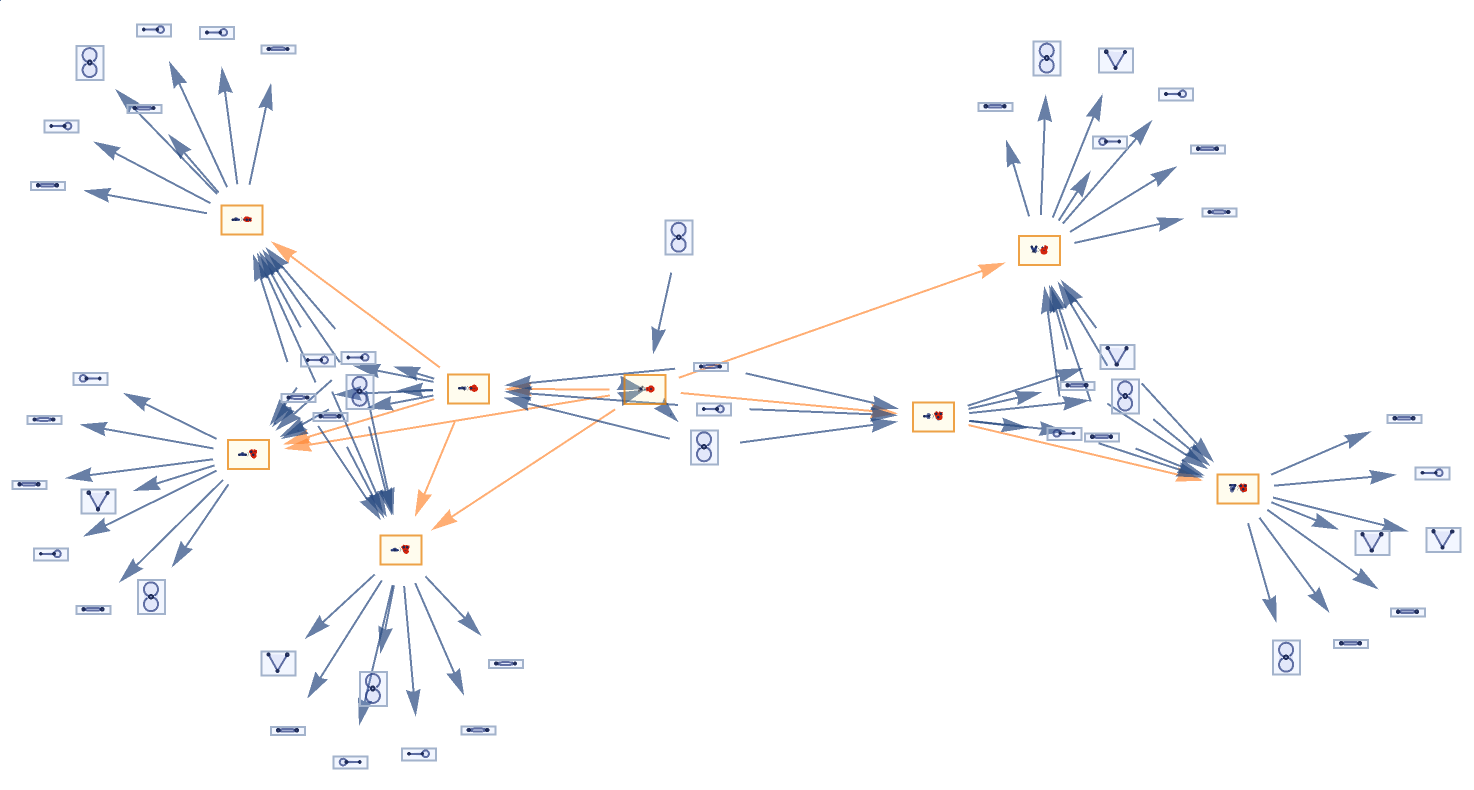
|
Merging of equivalent tokens at each time step can be enforced using the option "DeduplicateTokens":
| In[19]:= |
|
| Out[19]= |
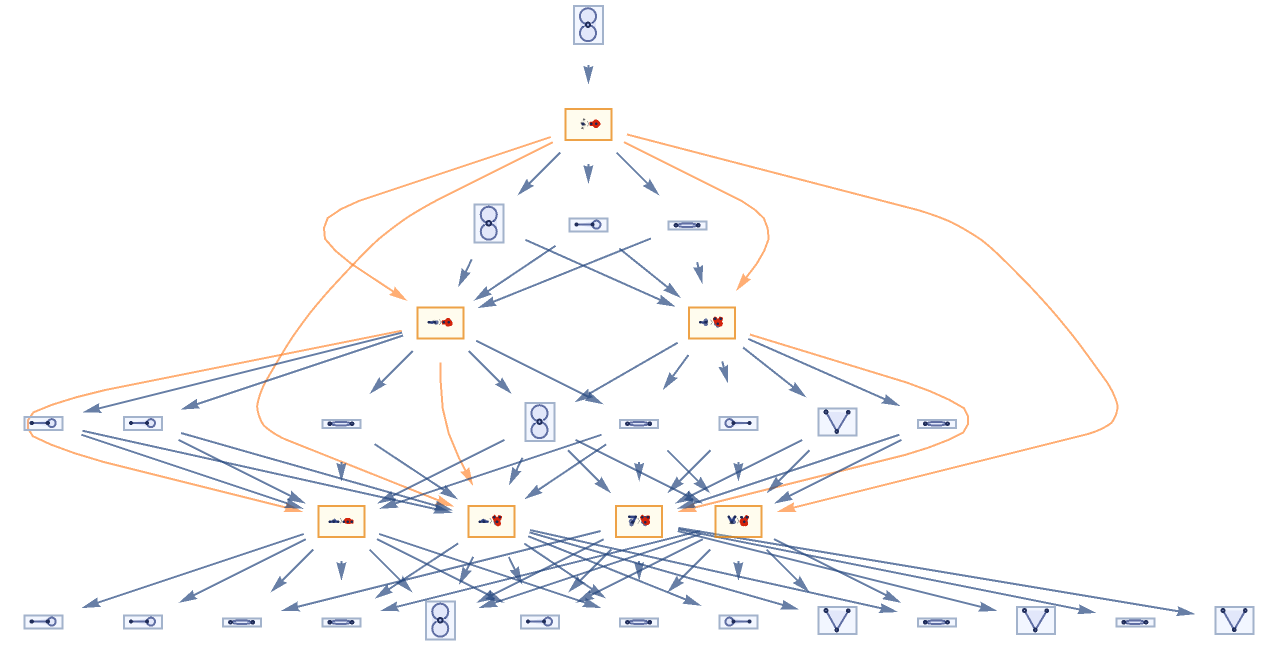
|
By default, state/token vertices and event vertices use special rendering (inherited from the MultiwaySystem resource function):
| In[20]:= |
|
| Out[20]= |

|
This rendering can be disabled using the option "VertexRendering":
| In[21]:= |
|
| Out[21]= |

|
By default, states/tokens are labeled by their contents:
| In[22]:= |
|
| Out[22]= |
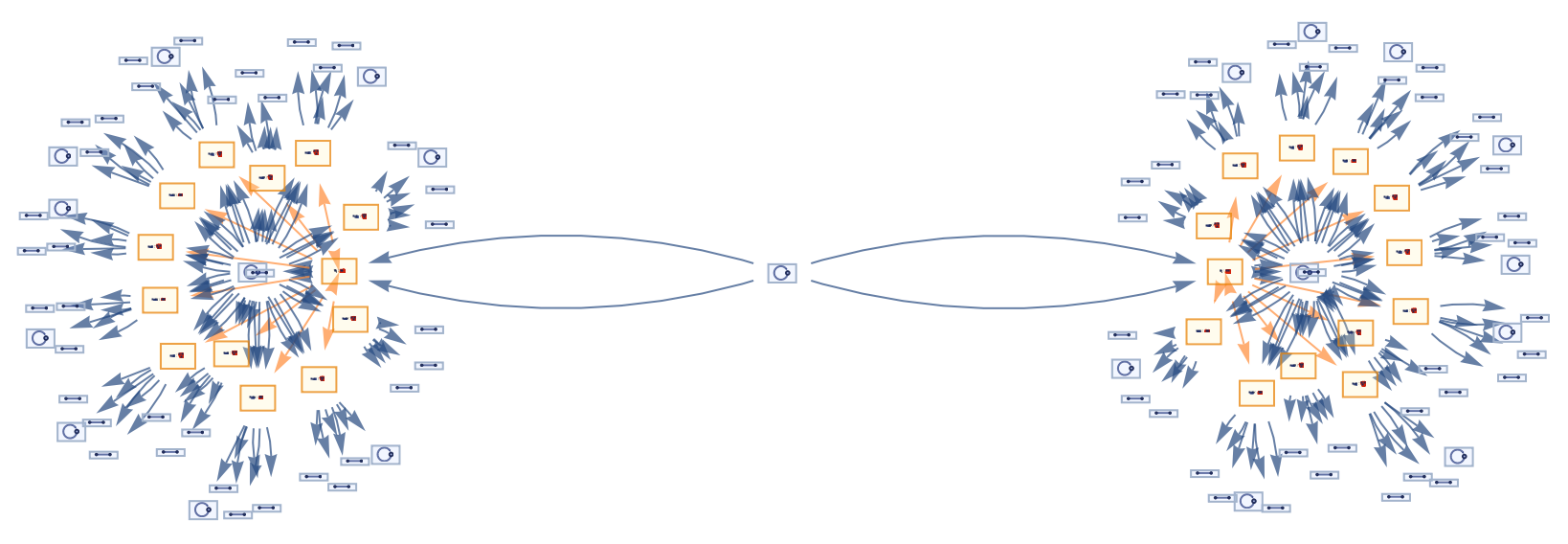
|
Use no labeling for states/tokens:
| In[23]:= |
|
| Out[23]= |
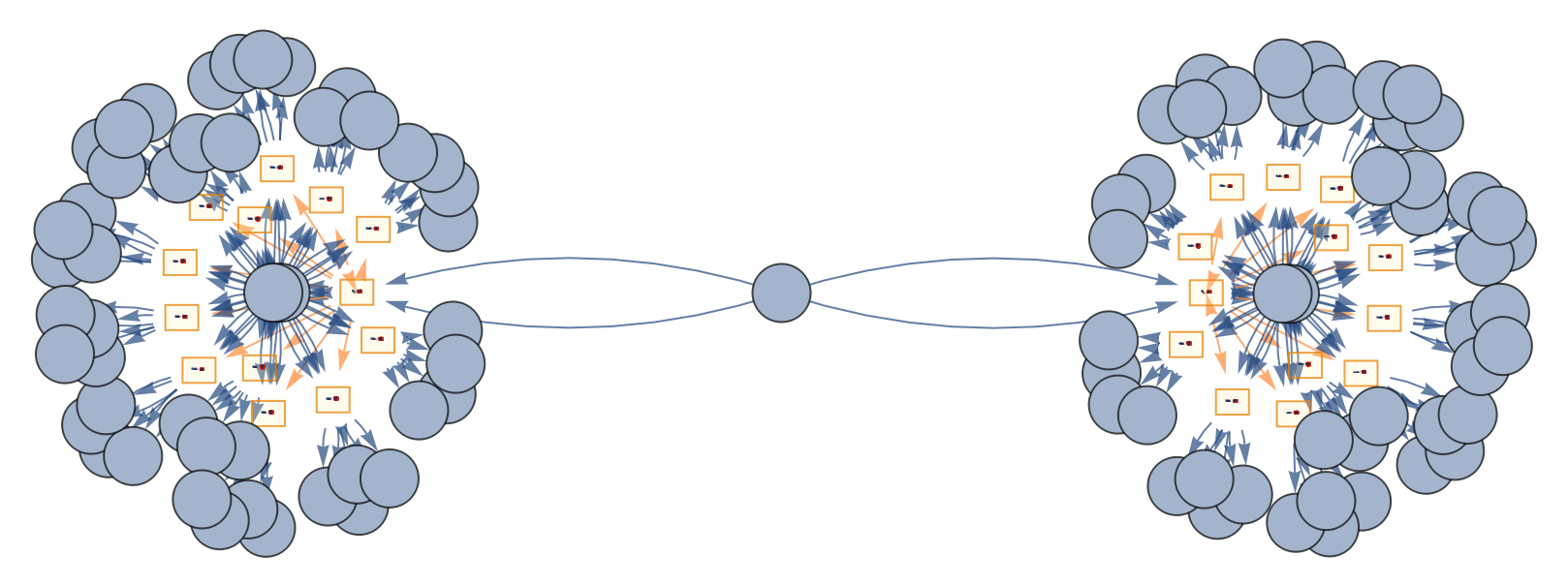
|
Use raw state/token names as vertex labels:
| In[24]:= |
|
| Out[24]= |
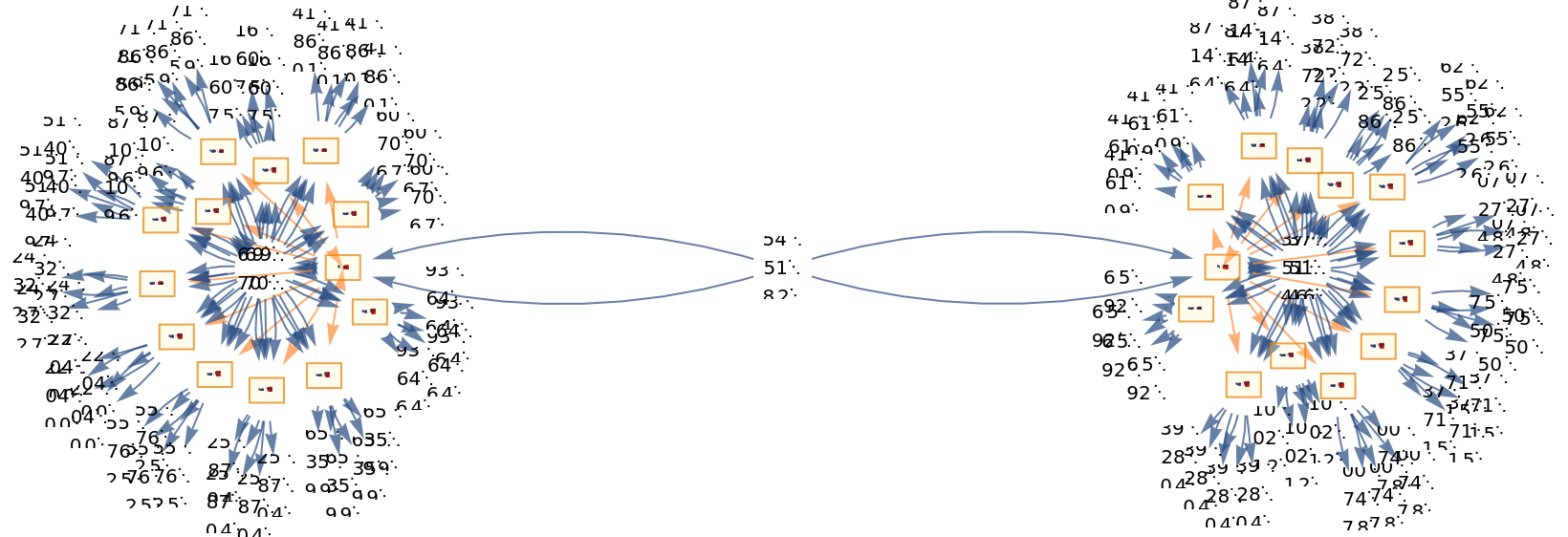
|
Use a named shape as each state/token label:
| In[25]:= |
|
| Out[25]= |
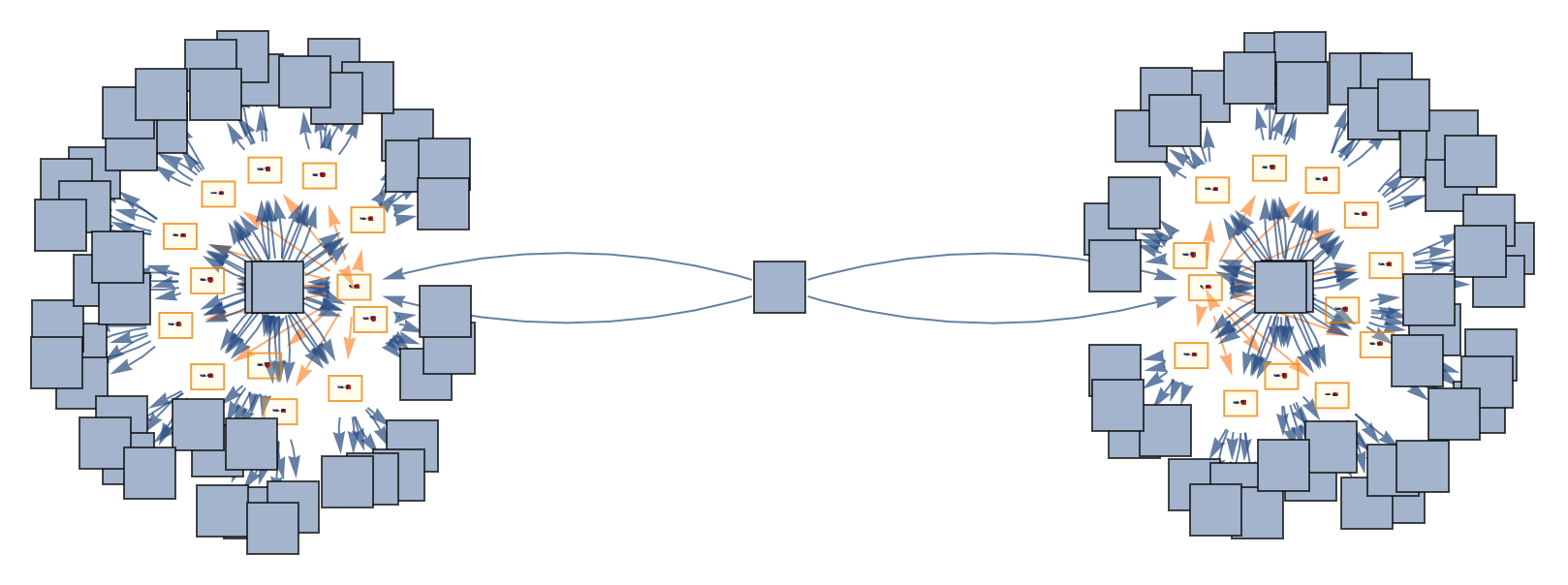
|
By default, both states/tokens and events are labeled by their contents:
| In[26]:= |
|
| Out[26]= |
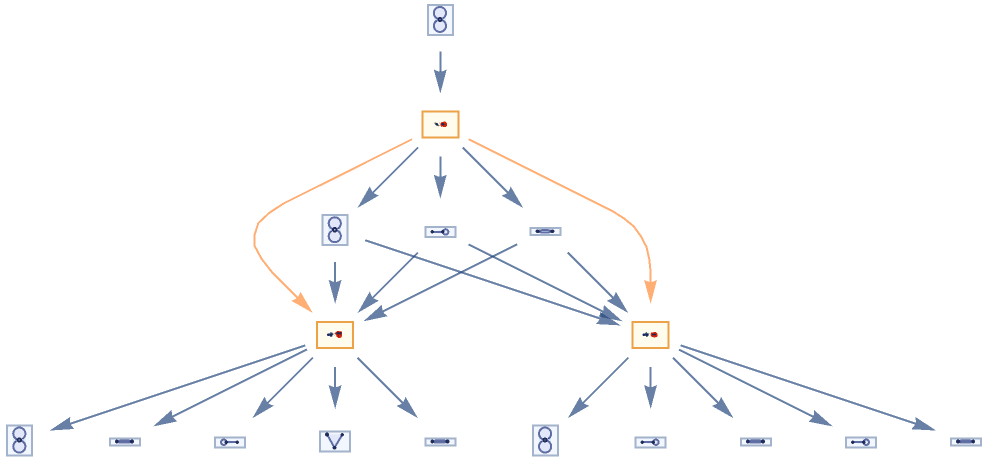
|
Use no labeling for states/tokens:
| In[27]:= |
|
| Out[27]= |
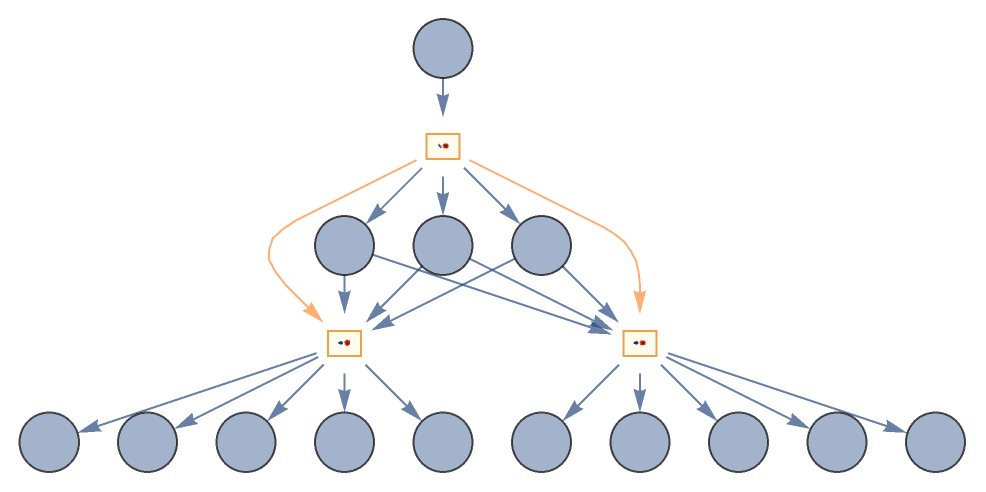
|
Also use no labeling for events:
| In[28]:= |
|
| Out[28]= |
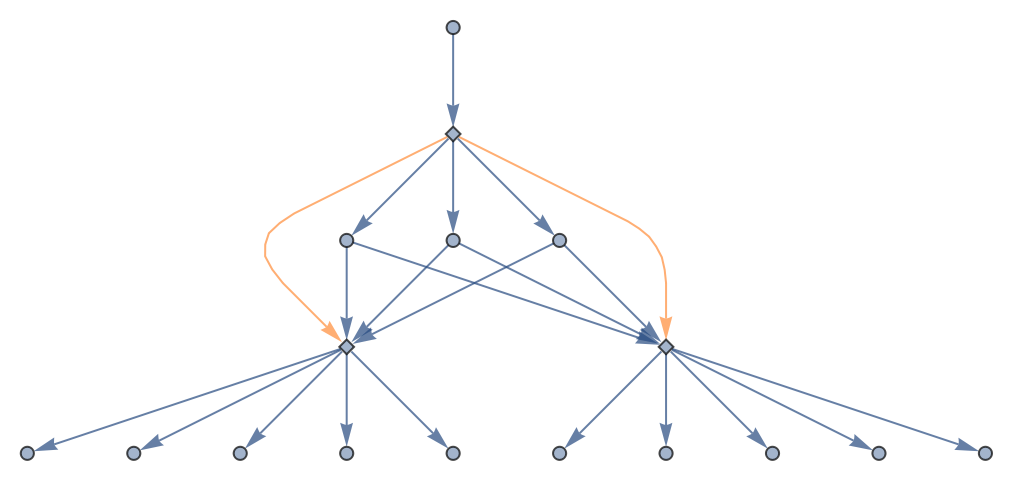
|
Disabling vertex rendering yields an equivalent result:
| In[29]:= |
|
| Out[29]= |
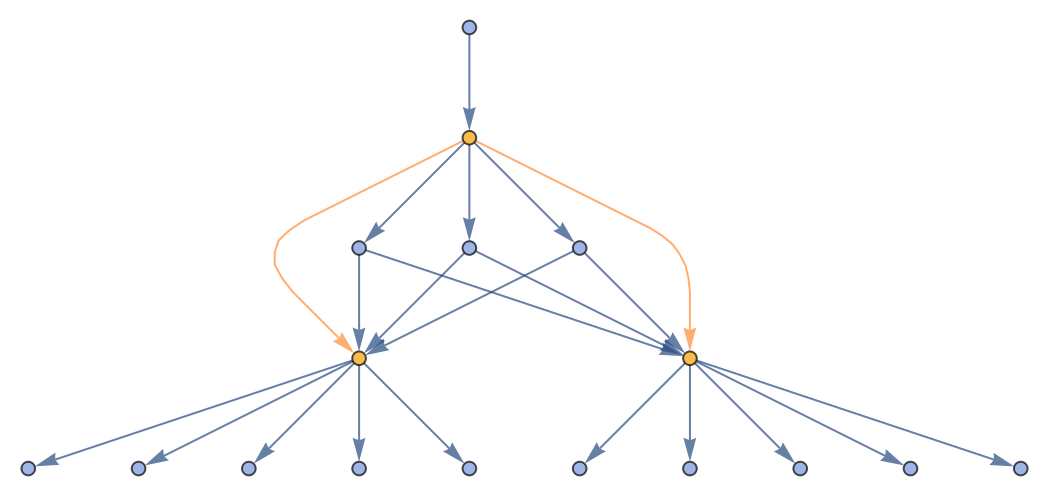
|
Use raw event expressions as their labels:
| In[30]:= |
|
| Out[30]= |
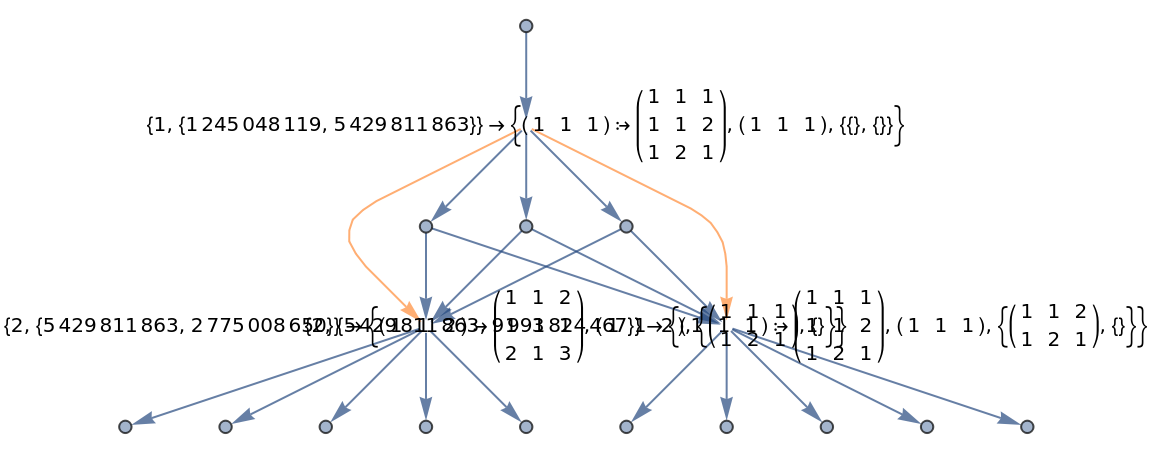
|
By default, Wolfram model glocal multiway systems do not include initialization events:
| In[31]:= |
|
| Out[31]= |
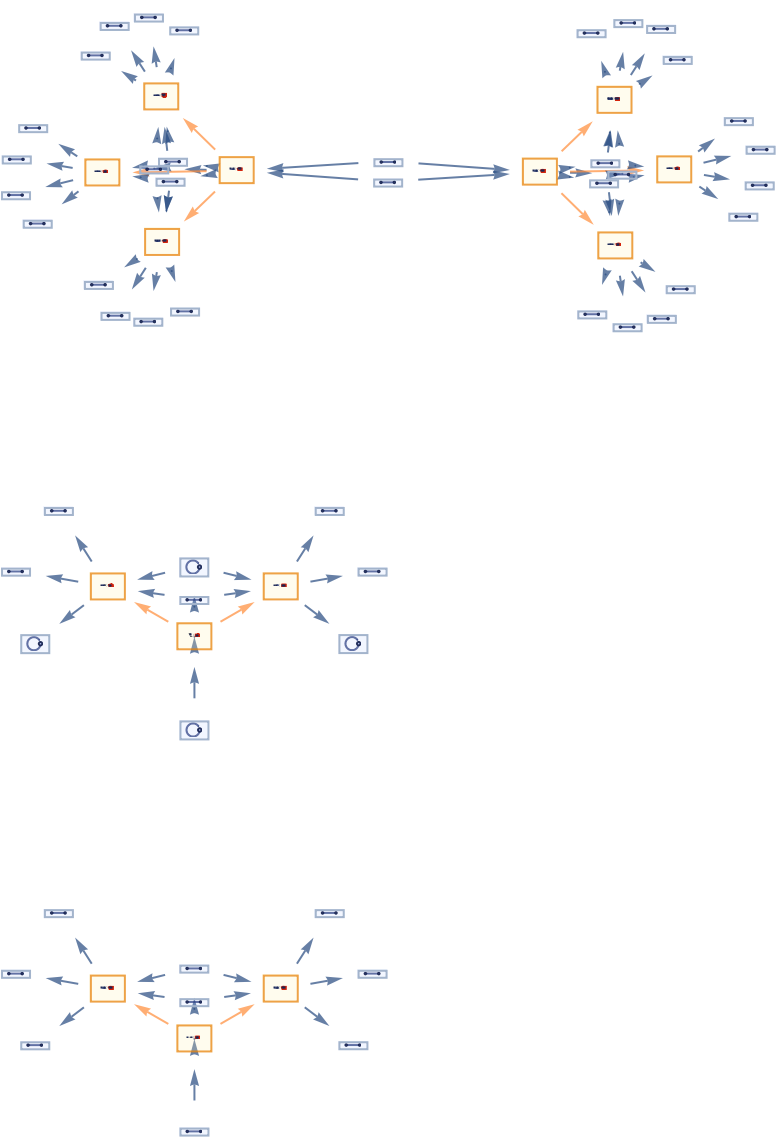
|
Disable vertex rendering:
| In[32]:= |
|
| Out[32]= |
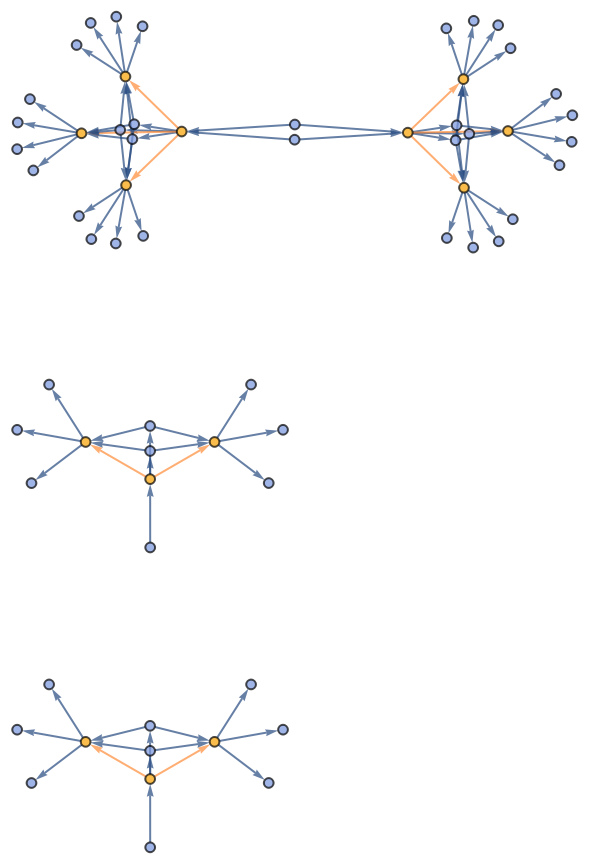
|
The option "IncludeInitializationEvents" allows one to override this default (note that initialization events have special default rendering):
| In[33]:= |
|
| Out[33]= |
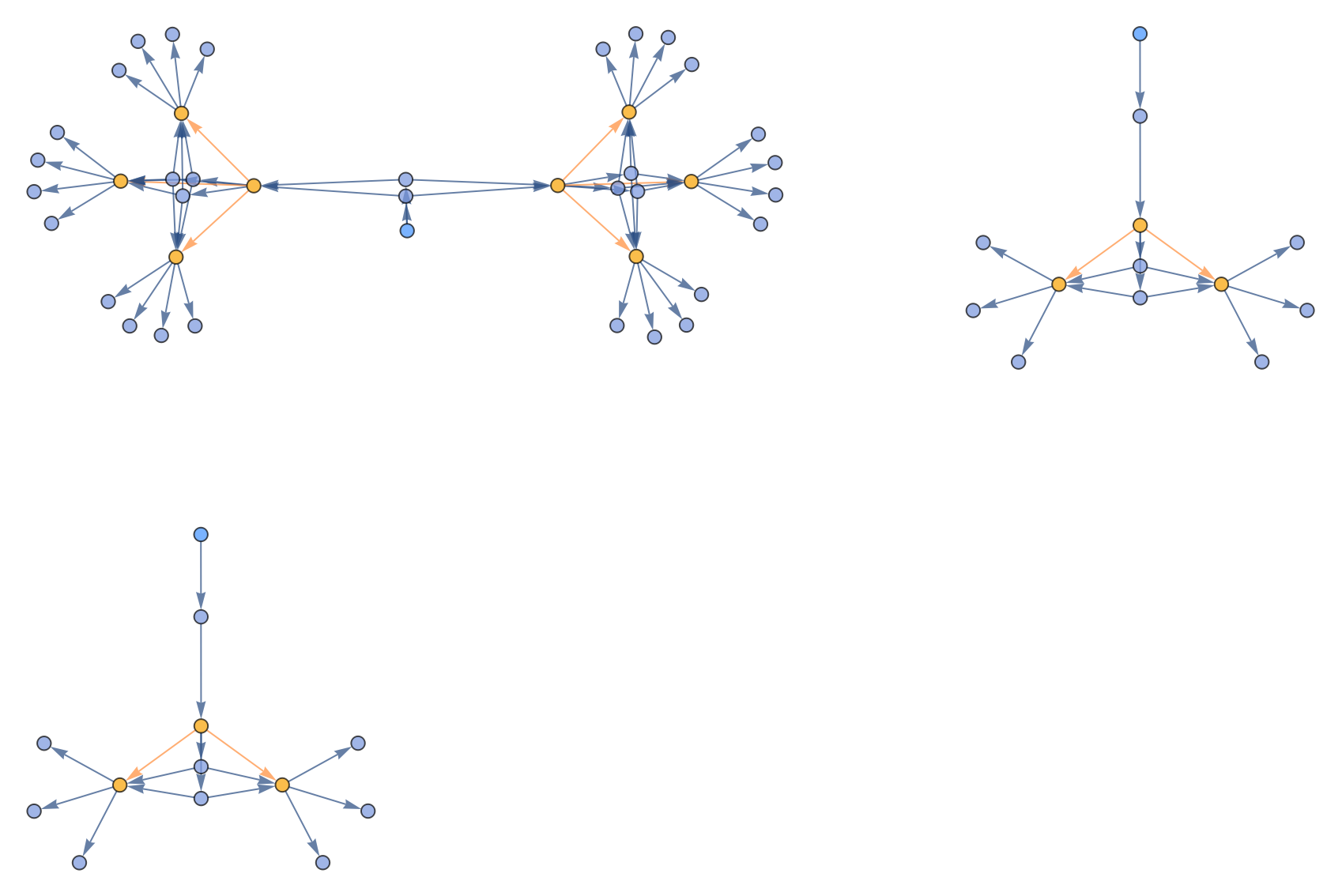
|
Place arrows in the middle of edges:
| In[34]:= |
![ResourceFunction[
"WolframModelGlocalMultiwaySystem"][{{{1, 1, 2}} -> {{2, 2, 1}, {2, 3, 2}, {1, 2, 3}}, {{1, 2, 1}, {3, 4, 2}} -> {{4, 3, 2}}}, {{1, 1, 1}}, 2, EdgeShapeFunction -> GraphElementData["ShortFilledArrow", "ArrowSize" -> 0.03], VertexSize -> 0.8]](https://www.wolframcloud.com/obj/resourcesystem/images/0a0/0a0cdd51-fb02-4bb6-99f2-41a751d342ce/3766b33e8a4419b2.png)
|
| Out[34]= |
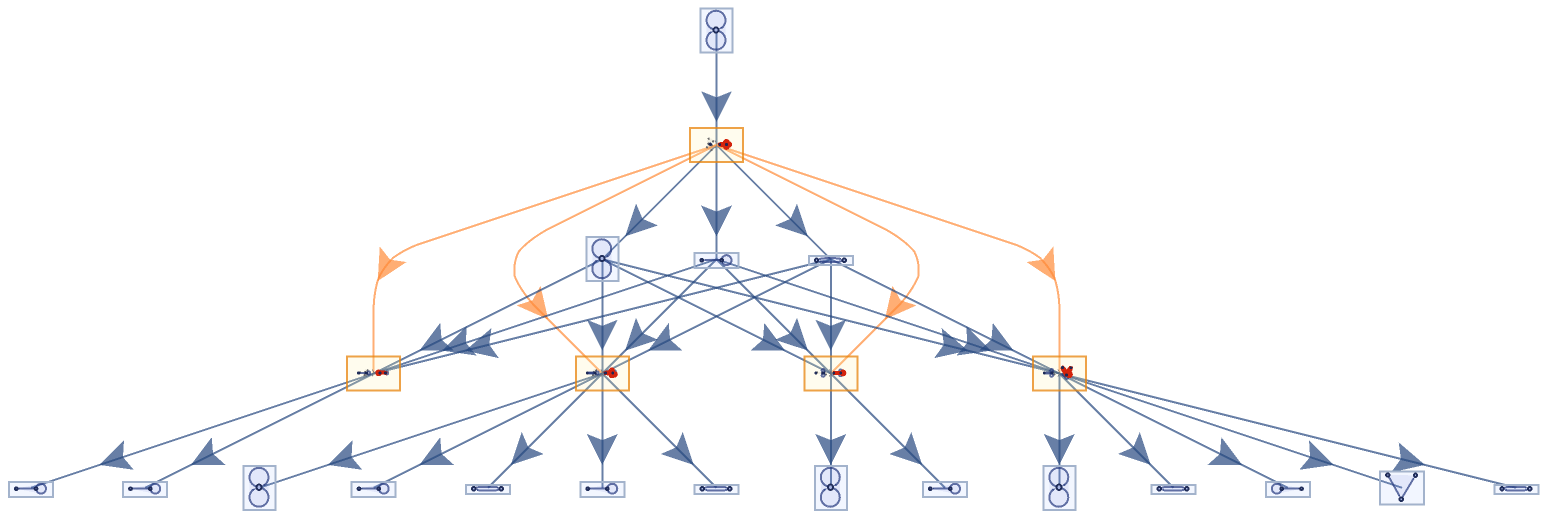
|
Generate an example glocal multiway evolution:
| In[35]:= |
|
| Out[35]= |
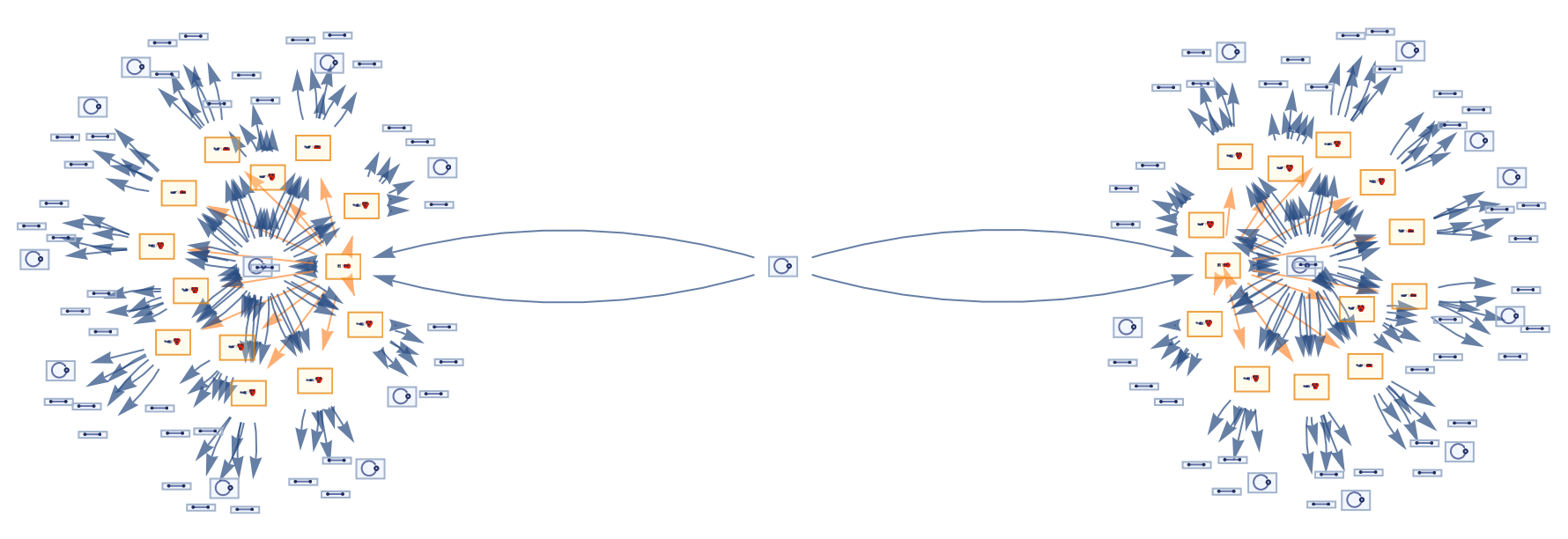
|
Force a layered digraph embedding with the initial state/token at the top:
| In[36]:= |
![ResourceFunction[
"WolframModelGlocalMultiwaySystem"][{{x, y}, {x, z}} -> {{x, z}, {x, w}, {y, w}, {z, w}}, {{0, 0}, {0, 0}}, 2, GraphLayout -> "LayeredDigraphEmbedding", AspectRatio -> 1/2, VertexSize -> 8]](https://www.wolframcloud.com/obj/resourcesystem/images/0a0/0a0cdd51-fb02-4bb6-99f2-41a751d342ce/3adf63e64e07f3f2.png)
|
| Out[36]= |
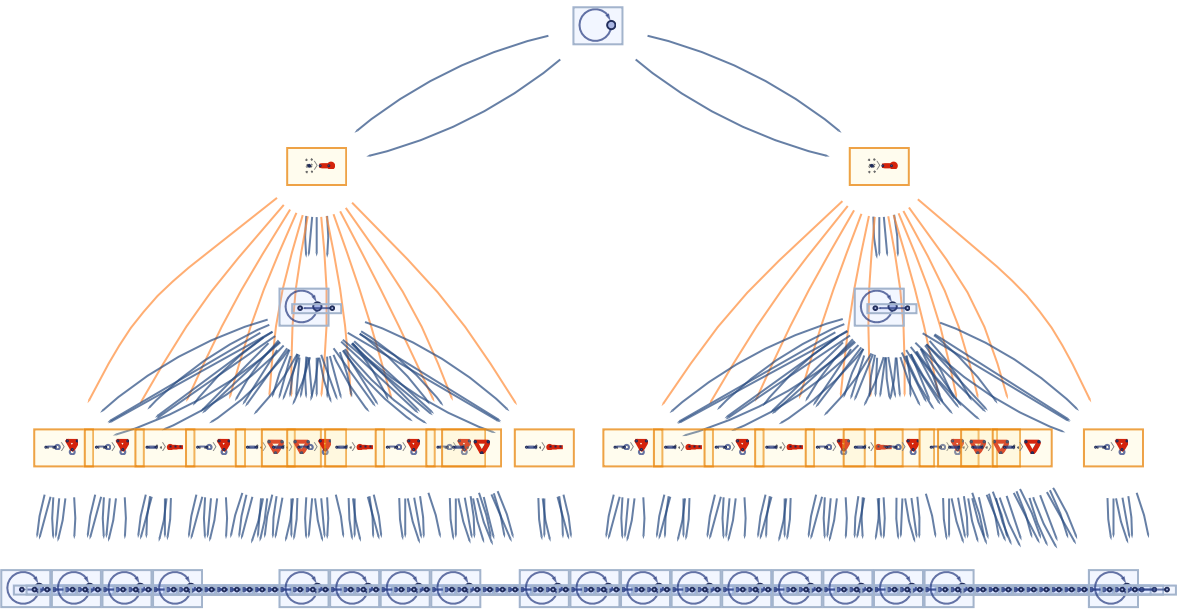
|
This work is licensed under a Creative Commons Attribution 4.0 International License